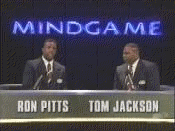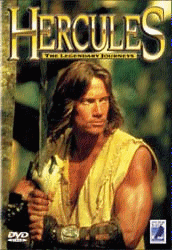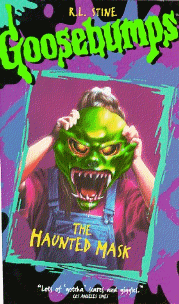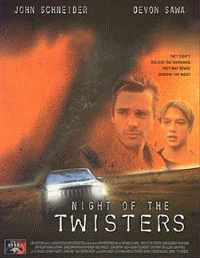|
Find interviews by: | ||
Timothy Bond (Part 3) Go back to Part 1 or Part 2 of this very long interview You also did an episode of Sliders, the one where brains are valued more than sport. "That's correct, yes. Boy, did you ever do your research." That was a bizarre idea. How did you approach it? "It was weird, wasn't it? I didn't invent it, of course. It was dumped in my lap. And there was a kind of an idea for a game, but no rules. So I actually spent a considerable amont of my prep-time inventing the game. I actually got the staff from the office out into the parking lot several times, playing the game, while we got workable rules. the first few times the rules were no good, the game was no fun. Eventually we came up with a set of rules which I then had to teach to all those actors. I went and got a lot of people with a sports background and we taught them the game, along with the leading actors on their lunch breaks. Then we had to construct this huge scoreboard. The producers were adamant that it look like a network sporting event, like a real thing. Which was great. So they went out and they hired real sports commentators. All those guys who were commenting on it were well-known."
"No, but in America they're really well known. I'm not much of a sports fans so [whispers] I didn't actually know who they were. But all the guys on the crew were going, 'Oh my God, that's...' 'Oh yes, that's him. That's what he said his name was.' But they were great guys, and I was amazed. You give them a subject and they just talk until you say stop. So they adlibbed a lot of their stuff, the commentary. And we came up with this scoreboard that was so big that the first time we turned it on, which was the first time we were about to make a shot, it killed the generator! It drew too much power; there had been a little miscalculation somewhere: 'What? You mean the red and the green lights are on at the same time?' So it was a very exciting time; we were down for half a day. "It was a memorable shoot for me because I actually had one day when I had seven cameras, which was frightening. Trying to give each one of those guys a shot is a tall order, especially when your mind is screaming along, trying to keep shooting on a television schedule. Three film cameras and four video cameras. The video cameras had to be fed through a switcher to monitors on the floor, with a live cut, and also slaved off so that we could eventually change the cut and cut things into the show. But it was so the sports commenators had things to look at and so the audience could catch the action on their monitors in the background of shot."
"They're fun." That's really caught on over here. "Has it? Oh good. Hercules is so much fun to do for a director. Partly because the executive producer Sam Raimi is a director, and you really know you're working for a company that's owned by a director because the doors are open for you: here you go. If you have an idea and it looks good, they go out and they find the money for it. If it sounds like it'll be fun, they'll really go and find the money to do any crazy idea. If there's no budget, they'll take it from somewhere else or whatever. They're very supportive of their directors. I think it shows up in the material becuse it's funny and it's light and it feels like it must have been fun to shoot, don't you think?" The impression you always get is that it's a bunch of guys having a great time. "We do. All day long. You have to crank it out, God knows, but it is fun all day long. That actor Kevin Sorbo is a real treat. He's everybody's favourite television star because he loves it. He realises, I think, that he came to stardom a little late in life. Most guys are about 12, but he came to it when he was in his late 20s or early 30s. So he didn't have any illusions. He knows that he's really lucky, so he shouldn't get bored or throw his weight around. So as a result he's always prepared, he's thought about things. He's very good at re-writing lines to make them funnier. He's always on time, he always knows what he's doing. He's a real treat. I look forward to doing them and I still try to do them when I can." How many have you done so far? "Three, I think." It must be nice going to New Zealand. "Well, it's a long flight. But the New Zealand film industry is a real pleasure. I guess Hercules must be by far the biggest thing in the country, because they have both Hercules and Xena. They told me at one point that between the two shows they had 750 people on the pay-roll. So they're a big employer. But it is fun, and New Zealand is great, especially in the summer." Have you done any Xenas yet? "No, I haven't. I would like to. I think Kevin Sorbo and I got on, and so they tended always to route me towards the Hercules for that reason, because we always enjoyed working with one another. There's a tendency to give me the really effects-intensive shows. I did one where Hercules' mother is getting married to Jason, of Argonauts fame, and at the wedding a sea-monster shows up and swallows Jason. And without blinking his eye, Hercules dives into the mouth of the sea-monster to save Jason, goes down the gullet of the sea-monster while it disappears into the ocean. Then we spent about ten minutes inside the monster while it was engaged in a battle with some other hideous creature in the depths of the ocean. So everything's sloshing around while they find their way through the guts of the monster. It was fun! Eventually, they get to the spinal column, Hercules hotwires the nervous system of the monster and causes it to lose its battle with this other thing! It gets killed and floats to the surface and they chop their way out while it's washing up on the beach, then go back to the wedding. What an opportunity for a director to do that. That was such a treat to do."
"Well, firstly the director doesn't have to worry about that too much. I think we're all children at heart. I just go in there and make it gory and goopy and scary as I can. But they have people who are watching, particularly at the script stage. They actually have child psychologists who gave over the script - and more power to them - to make sure that we don't create a generation of monsters. They look a lot for what they refer to as 'replicable behaviour'. This is not an example from one of the scripts, but if somebody goes into the post office and pulls a gun and kills everybody, that would not be in Goosebumps." But a vampire going in and biting everybody on the neck would be okay? "Yes, because that's fanciful and it could never happen. So they watch for that. I'm really proud of Goosebumps because I did the pilot for it, which is I think one of the highest selling children's videos around. It was called 'The Haunted Mask' and I know in America it sold something like four million copies of the tape. So I'm rather pleased that a hell of a lot of kiddies liked it. I actually had to delist my phone number because children started calling me. Actually, what they were calling for was they wanted the phone numbers of the girls!" That must have been a big responsibility, because the Goosebumps books are an enormous franchise. "Yes, there was a lot riding on it, and this is an example of not doing episode two. So there was a lot of extremely helpful help. It was a wonderful experience because the people who were hovering and watching were very, very positive and very helpful. RL Stine, who writes the books, was there for a while and was also extremely helpful. So it was a good experience and I then went on and did a few more specials for them. It's fun material. Stine has an interesting imagination. He'll find something primal, like some primal fear. 'The Haunted Mask' is about a girl who wants to scare her friends at Halloween, so she goes to this weird store and buys a really scary mask from this odd guy. She goes out on Halloween and does truly frighten all her friends. Then when she comes home with the mask, it won't come off. Then there's all the hocus pocus she has to go through to get it off. But it's all about wishing you were somebody you're not and how that can get you into trouble. How you can wish it in a fanciful way, but you'd better mean it because... what if you get your wish? All of his stories have some sort of underlying, powerful thing like that. They're not just scary; there's a moral there. He understands the teen and sub-teen psyche - the things that obsess them and worry them - so he taps into that in a very clever way. His material is fun to work on."
"Night of the Twisters." That was on last week, and the listings mag said, 'It's okay, but it wouldn't have been made if somebody hadn't been making Twister at the same time.' "Oh, that was definitely the case. I've done a couple of things where the cynical calculation was made, and that was definitely the case. The network involved was called The Family Channel, who are a small cable channel here that is growing very quickly because they're very shrewd about things like this. They knew that Jan de Bont was making Twister, so we made Night of the Twisters to play on television two months or three months before Twister was in the theatres. Now that is so smart. They did our advertising for us. To give them their due though, they were advertising the hell out of it. There were billboards on Sunset Boulevard. They really went at it hammer and tongs. And it was the highest-rated movie on cable television in America that year. It kept on playing and playing and playing. I'm really proud of that one too." That was done with Atlantis, who do a lot of SF and fantasy. "They do that Gene Roddenberry thing that people refer to as Gene Roddenberry's Trunk Show - although maybe they shouldn't. They're very active in science fiction. They have a very clever producer/production designer there who designed Tekwar, who produces an amazing look and really understands computer-generated effects." What have you got lined up? "I don't want to jinx this, but I've just had some enquiries about doing a pool of science fiction movies which would shoot in Europe. I don't know too much about them except that the budgets are halfway decent for television movies, and I'm to read some scripts today for the first time." Is this the batch of stuff that UPN were thinking of doing? Variety said that they wanted a regular science fiction movie slot. "Exactly. That has the potential to be really fun stuff so I have high hopes for it. I'm actually going to go and see them today. They're probably seeing a hundred other directors and maybe I'll never end up doing any of it. Who knows, but it does sound exciting." [The UPN series of SF telemovies never happened. However, Tim has continued to work steadily, including the pilot of Animorphs, from the same stable as Goosebumps, and a new version of Rider Haggard's She for producer Harry Alan Towers. - MJS] Go back to Part 2 of this very long interview, where Timothy Bond discusses his work on Star Trek: The Next Generation, The Outer Limits and TekWar. Or go right back to Part 1 where he talks about The Shadow Men and how he got his start as a director on Canadian TV | ||




